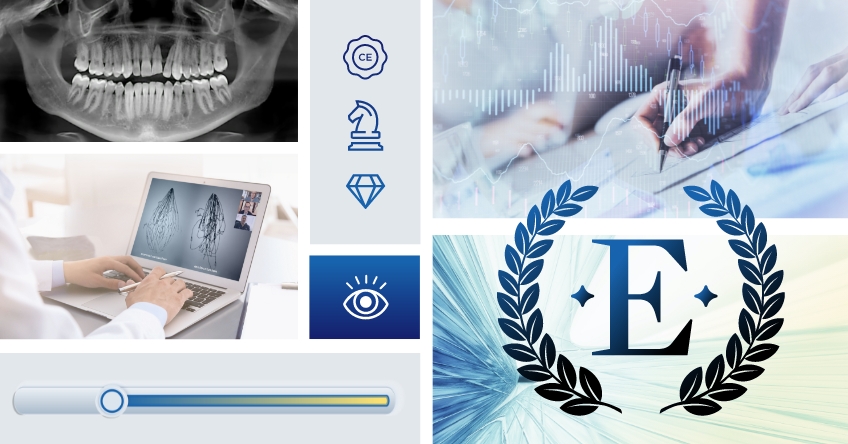Piloting a New Learning Path – The Creation of Spear Interactive
By Emma Humphrey on December 27, 2021 |
From inspiration to innovation: creating a new Spear membership
“We've all had that case sitting in our chair, that file sitting on our desk – a complicated clinical challenge that both dentist and patient want resolved in the best possible way, but the path to that outcome isn't always clear. What if you didn't have to come up with the solution on your own? What if you had exclusive access to a supportive network of dental experts?” asked Dr. Greggory Kinzer at the 2021 Spear Summit, an annual event recognizing and celebrating the Pursuit of Great Dentistry.
The pandemic posed a unique opportunity for Spear leadership to review and reassess how clinicians had been learning and to see what possibilities existed to make upskilling more flexible, convenient, and achievable. Spear historically offered mostly in-person learning experiences but, starting in 2020, began to explore broader digital learning for even bread-and-butter offerings like seminars and Spear Study Club.
“Spear is looking to try new things and change the way people learn. Not many companies are out there doing that right now, they're sticking to what they've always offered, or just offering the same things online.”
– Dr. David Fox, Faculty Club Member and Spear Interactive Pilot Participant
Research revealed that within the Spear ecosystem is a group of highly motivated, goal-focused learners eager for something that did not yet exist. Spear Faculty Club Elite was announced virtually at Spear Summit on October 29, 2021. This new membership allows clinicians to dig deeper into specific topics of interest and achieve their clinical, leadership, and practice management goals in even less time and with more consistent results.
There's no real analog for Spear Interactive available in the world of dental continuing education, so starting at the end of August and concluding in mid-October, an ambitious pilot for Spear Interactive featured three small groups of clinicians who had completed the Facially Generated Treatment Planning workshop. The participants' years in practice varied significantly to ensure Spear Interactive would be evaluated as an effective tool for dentists whether they were in their first 10 or last 10 years of practice.
The Treatment Planning Essentials: Managing “Esthetic” Dilemmas
The initial program included 2 session types: facilitator-led small group learning and faculty-led large group learning with assigned individual projects in between. Based on findings from the pilot program, additional touch points have since been added to streamline participation and to improve retention and implementation for new concepts.
There are 5 types of sessions involved with the Spear Interactive experience:
- Facilitator-led small group sessions (1.5 hours) – These working sessions occur in intimate groups of 9-12 participants along with a trained Spear facilitator. Members of Spear Faculty Club Elite who register for a Spear Interactive program will be grouped with other highly motivated clinicians to work through case materials and treatment planning solutions together.
For those familiar with the dental study club experience, these small group sessions will feel familiar but more structured and will be led by a mentoring general practitioner. One key difference is that, traditionally, clubs are led by surgeons rather than by restorative dentists. Both study club facilitators and Spear Interactive facilitators aim to stimulate discussion — but having a practical commonality really improves understanding for learners. For each session, two facilitator-led meeting options will be offered to ensure convenient attendance across time zones.
- Moderator-led tech check sessions (1 hour) – Early in the program, participants will go through a tech check to ensure they can navigate the necessary meeting tools and applications to participate fully.
- Peer-to-peer study group sessions (1 hour) – Guided study groups follow facilitator or faculty-led sessions to ensure participants stay on track. Clinicians complete related assignments and readings on clinical history and technique. These small group sessions offer time between facilitated sessions to discuss the assignments, address any questions, and network with peers.
- Faculty-led large group sessions (4.5 hours) – Sit in on lectures and interactive sessions in larger groups of 30-60, led by Spear Resident Faculty members. These faculty-led sessions will combine multiple small groups into a larger learning cohort.
- Faculty-led office hours (1 hour) – When the program has concluded, participants can reconnect in a collaborative session with their Spear Resident Faculty mentors to discuss the material, ask questions, and receive implementation assistance.
Spear Interactive can be compared with a residency or a fellowship program, but without the need to shut practice doors, be away from family, or travel. Over the course of the multi-week virtual program, participants complete projects and read assigned literature on their own and in small group sessions, arriving at their next session with cameras on and prepared to excitedly discuss topics as part of an engaged community.
“In traditional learning for dental education, you have somebody at the front of the room that tells you what you need to know. What we wanted to do was have the individuals dive deeper. To know that they could be the one that could give the answers, know where the answers originated, and know the literature,” shared Dr. Greggory Kinzer. “You have to become different than the guy next door. When you do know it at that level, you are no longer the average practicing dentist. This allows you to further your knowledge and you'll talk and behave differently.”

Unprecedented and unmatched clinical education
This new interactive virtual experience combines more intimate access to faculty and the power of small-group learning. With Spear Interactive, you'll master critical clinical concepts in guided explorations of complex techniques and foster relationships with learning peers and mentors in this multi-week program.
Spear Interactive aims to empower dentists to contemplate the limitations of their current knowledge, ask questions in a supportive environment, and learn how to effectively research solutions. It also creates lifelong learners who understand their clinical challenges more holistically. From there, they can turn those challenges into actionable change within their practice to improve both the patient experience and their practice's community standing.
“Learning sometimes comes with a bit of apprehension and acknowledging there are still things you don't know – even after years of practice – can be a bit intimidating. But it's nice to feel that apprehension a bit again so I know I'm really growing,” said Dr. Fox.
The format of this hybrid series is unique in that it requires a dedication to learning that is usually reserved for graduate programs; participants will work on projects on their own time, as well as during interactive sessions. Between sessions, participants will complete related assignments and assigned literature from the Spear Interactive library.
Learning to read literature and validate findings are not something most general dentists did in dental school. Spear Interactive facilitator Dr. Janette Larsen revealed that the literature review within the program helps clinicians in their interdisciplinary treatment planning through knowledge of terminology. When you do begin to learn the literature, you begin to establish a common language with your partnering specialists that improves collaboration.
“We layer the learning. We give you information to recognize a problem, but by the fourth or fifth time we've met, you get all of the pieces to act on what you've trained your eyes to see.”
– Dr. Greggory Kinzer, Resident Faculty and Spear Interactive Faculty Mentor
Rather than replace hands-on workshops, Spear Interactive is designed to be an in-depth exploration of each of the pillars of treatment planning. The principles of facially generated treatment planning taught at Spear start a mindset shift to see patients differently and to see greater opportunity in the operatory.
Much of the Spear Interactive experience is focused on expanding and focusing that into a deep exploration of a treatment planning pillar like esthetics. “In the 3rd session of the course, we showcase world-class lecturers who don't see the issues,” Dr. Jeffrey Rouse, a Spear resident faculty instructor, concluded. “By showing them that they now know it at a higher level, we build their confidence to start doing those cases.”
Spear Interactive starts with Esthetics in January and May with future sessions scheduled to cover Function, Structure, and Biology, culminating with Advanced Treatment Planning to tie it all together with airway awareness. Members can work with their dedicated Success Manager to join Spear Faculty Club Elite, then register for Spear Interactive sessions in 2022.
“You'll see bigger improvement in your office, your systems, and what you're able to offer patients.”
– Dr. Janette Larsen, Visiting Faculty and Spear Interactive Facilitator